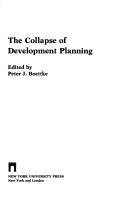| Listing 1 - 6 of 6 |
Sort by
|

ISBN: 0814712258 9780814712252 0814712169 0814723454 Year: 1994 Volume: *1 Publisher: New York (N.Y.): New York University press,
Abstract | Keywords | Export | Availability | Bookmark
 Loading...
Loading...Choose an application
- Reference Manager
- EndNote
- RefWorks (Direct export to RefWorks)
Développement économique --- Economic development --- Economic growth --- Economische ontwikkeling --- Case studies --- Economic development - Case studies
Book
ISBN: 1849806470 1849809518 9781849806473 9781849809511 9781847204110 1283457768 9786613457769 1847204112 Year: 2010 Publisher: Cheltenham : Edward Elgar,
Abstract | Keywords | Export | Availability | Bookmark
 Loading...
Loading...Choose an application
- Reference Manager
- EndNote
- RefWorks (Direct export to RefWorks)
Economics --- Austrian school of economics --- AA / International- internationaal --- 330.46 --- Hedendaagse periode, met inbegrip van de psychologische school (Oostenrijkse), mathematische school, solidarisme, communisme, marxisme, bolsjewisme, anarchisme. --- Macroeconomics --- Microeconomics --- Value --- Standard of value --- Cost --- Exchange --- Wealth --- Prices --- Supply and demand --- Price theory --- Austrian school of economists --- Marginalist school of economics --- Schools of economics --- Marginal utility --- Hedendaagse periode, met inbegrip van de psychologische school (Oostenrijkse), mathematische school, solidarisme, communisme, marxisme, bolsjewisme, anarchisme --- Economic schools --- Austria --- Evolutionary economics --- Economists --- Austrian school of economics. --- Economists - Austria --- École autrichienne d'économie politique --- Économie politique --- Histoire --- Autriche
Book
ISBN: 9781137411594 9781137411600 1137411597 1137411600 Year: 2018 Publisher: London : Palgrave Macmillan UK : Imprint: Palgrave Macmillan,
Abstract | Keywords | Export | Availability | Bookmark
 Loading...
Loading...Choose an application
- Reference Manager
- EndNote
- RefWorks (Direct export to RefWorks)
This book explores the life and work of Austrian-British economist, political economist, and social philosopher, Friedrich Hayek. Set within a context of the recent financial crisis, alongside the renewed interest in Hayek and the Hayek-Keynes debate, the book introduces the main themes of Hayek’s thought. These include the division of knowledge, the importance of rules, the problems with planning and economic management, and the role of constitutional constraints in enabling the emergence of unplanned order in the market by limiting the perverse incentives and distortions in information often associated with political discretion. Key to understanding Hayek's development as a thinker is his emphasis on the knowledge problem that economic decision makers face and how alternative institutional arrangements either hinder or assist them in overcoming that epistemic dilemma. Hayek saw order emerging from individual action and responsibility under the appropriate institutional order that itself emerges from actors discovering new and better ways to coordinate their behavior. This book will be of interest to all those keen to gain a deeper understanding of this great 20th century thinker in economics. Peter Boettke is University Professor of Economics and Philosophy, Director of the F. A. Hayek Program for Advanced Study in Philosophy, Politics, and Economics, at George Mason University, USA..
Economic schools --- Hayek, Friedrich --- Political science --- Economics --- von Hayek, Friedrich August, - 1899-1992 - Political and social views --- von Hayek, Friedrich August, - 1899-1992 --- Economic history. --- Political economy. --- Economic policy. --- History of Economic Thought/Methodology. --- International Political Economy. --- Economic History. --- Economic Policy.
Book
ISBN: 1852785810 Year: 1994 Publisher: Cheltenham : Elgar,
Abstract | Keywords | Export | Availability | Bookmark
 Loading...
Loading...Choose an application
- Reference Manager
- EndNote
- RefWorks (Direct export to RefWorks)
Book
ISBN: 1852788542 Year: 1994 Publisher: Aldershot : Elgar,
Abstract | Keywords | Export | Availability | Bookmark
 Loading...
Loading...Choose an application
- Reference Manager
- EndNote
- RefWorks (Direct export to RefWorks)
Book
ISBN: 1108806783 9781108806787 9781108479844 9781108790840 110884619X 1108847854 1108479847 Year: 2021 Publisher: Cambridge, United Kingdom ; New York, NY : Cambridge University Press,
Abstract | Keywords | Export | Availability | Bookmark
 Loading...
Loading...Choose an application
- Reference Manager
- EndNote
- RefWorks (Direct export to RefWorks)
Contemporary monetary institutions are flawed at a foundational level. The reigning paradigm in monetary policy holds up constrained discretion as the preferred operating framework for central banks. But no matter how smart or well-intentioned are central bankers, discretionary policy contains information and incentive problems that make macroeconomic stability systematically unlikely. Furthermore, central bank discretion implicitly violates the basic jurisprudential norms of liberal democracy. Drawing on a wide body of scholarship, this volume presents a novel argument in favor of embedding monetary institutions into a rule of law framework. The authors argue for general, predictable rules to provide a sturdier foundation for economic growth and prosperity. A rule of law approach to monetary policy would remedy the flaws that resulted in misguided monetary responses to the 2007-8 financial crisis and the COVID-19 pandemic. Understanding the case for true monetary rules is the first step toward creating more stable monetary institutions.
Monetary policy. --- Banks and banking, Central. --- Banker's banks --- Banks, Central --- Central banking --- Central banks --- Banks and banking --- Monetary management --- Economic policy --- Currency boards --- Money supply
| Listing 1 - 6 of 6 |
Sort by
|

 Search
Search Feedback
Feedback About UniCat
About UniCat  Help
Help News
News